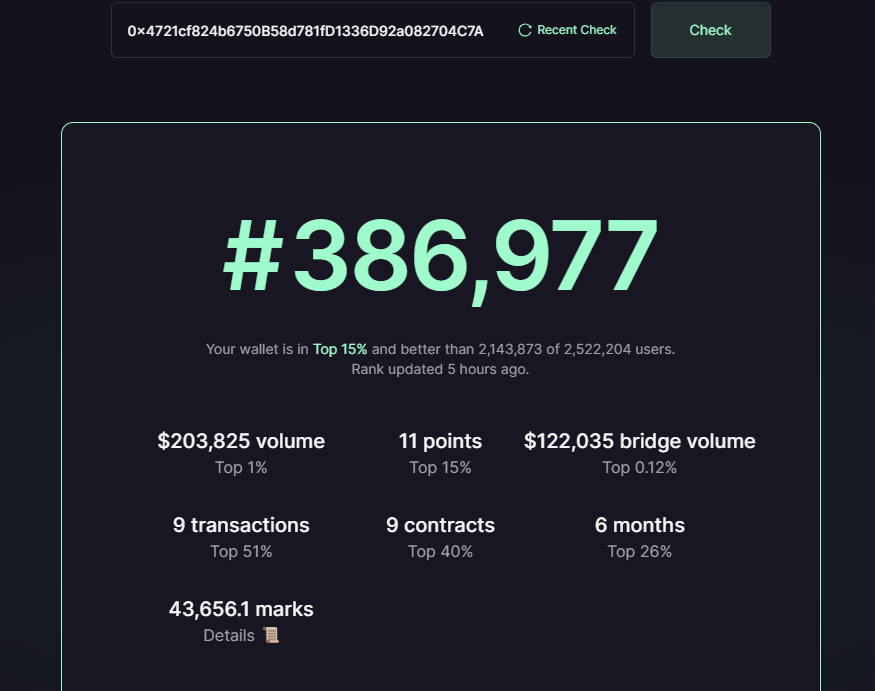The Scroll (SCR) airdrop is one of the long-awaited events in the coming weeks. On-chain research shows point allocation may be skewed toward protocol wallets and addresses linked to the project’s team.
Scroll (SCR) is favoring whale wallets and addresses linked to the team, already allocating airdrop points, or ‘marks’, as they are known in the protocol. Scroll itself has not mentioned its policy on team allocations, and not all team wallets are involved in airdrop missions. However, the wallet collection is watched closely due to previous unfair airdrops, as in the case of ZKSync (ZK).
The expectation for Scroll is that it would reward regular users for engaging with the ecosystem. However, the presence of whale wallets, other protocol partners, or addresses funded by the team may have an unfair advantage in point distribution.
The Scroll team has already allocated 23% to contributors, causing additional fears of also taking over the airdrop. The allocation for the public airdrop is 15% of the total supply, though the tokens will be split into two events. Additionally, the Scroll Foundation will retain 10% of the token supply.
As with other airdrops, Scroll simply encourages activities but has not signaled the approach to token distribution. The airdrop snapshot is coming this weekend, and the first SCR claims will be open from October 22.
According to unofficial allocation charts, the Scroll airdrop will resemble that of Starknet or Polyhedra, with caps across categories. The airdrop may allocate 70K SCR tokens to 2.5M users. Most of the actions for eligibility have been completed in the past months, and there is almost no time left for new users.
The airdrop will be calculated based on 300M marks to be distributed to 800K eligible addresses. An unofficial rate for the airdrop will be 0.06 SCR per mark. Even with an airdrop, Scroll will have a significant share of tokens held by investors and early contributors, skewing the balance against retail buyers and users.
Top addresses gain potential access to more SCR
The Scroll airdrop may be linear, awarding SCR based on accrued marks. Analysis of wallets linked to the founding address show some projects partners already accrued tens of thousands of marks.
One of the addresses linked to a team wallet already holds more than 1M marks. It is still uncertain if the project or team wallets would be eligible, but they can take a big chunk out of the available marks.
Scroll also relies on side apps such as bridges for its activities. The top 200 wallets are eligible for 40M marks, though it is uncertain if utility apps will receive the allocation. Those apps handle the biggest traffic to and from Scroll, with a distinct advantage over retail users with small tasks.
Airdrop season boosted Scroll statistics
Scroll worked as a tokenless protocol for months, and announced its upcoming airdrop relatively late. Despite this, almost all metrics for the L2 chain have grown rapidly, reflecting last-minute attempts to qualify for SCR before the airdrop.
Scroll achieved an all-time high of transfers, up to 710K in 24 hours. The active addresses also expanded to 120K daily, though far from their record peak. Scroll’s throughput also increased, a metric of the gas consumed per second. An increased throughput means more complex transactions and activities tied to apps or DeFi.
Total value locked on Scroll also expanded above $1.5B, though DeFi Llams puts the value at $981.38M based on a smaller list of reported apps. Scroll activity comes from Aave V3 usage, as well as native apps like Pencils Protocol and Tokan Exchange. More than 41% of all Scroll activity comes from DeFi and nearly 14% from simple token transfers. Scroll has positioned itself as a general utility chain, not tied to a specific app, hosting multiple Web3 features, including NFT and SocialFi.
The recent activity boost coincides with the lowest fees paid out to Ethereum as L1 rent. Scroll is the fifth largest source of blob postings on Ethereum, accelerating blobs in the past few days. Currently, blob postings are near the target range where projects may have to start paying a higher rent to Ethereum. However, most projects slow down their posting schedule and so far mostly stay under the target range.








